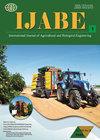线性偏振光和非偏振光对蝗虫视觉反应的影响
IF 2.2
2区 农林科学
Q2 AGRICULTURAL ENGINEERING
International Journal of Agricultural and Biological Engineering
Pub Date : 2023-01-01
DOI:10.25165/j.ijabe.20231603.7959
引用次数: 0
摘要
蝗虫灾害对全球许多地区的作物生产构成严重威胁。然而,目前缺乏有效、快速的方法来控制这类疫情。利用这些昆虫的光致反应的方法越来越受到人们的重视。本文研究了线偏振光和非偏振光对蝗虫光致和极致反应的影响,特别是背缘区和非背缘区视野的功能。结果表明:线偏振光和紫外光对DRA视觉的偏激功能权值有刺激作用,蓝、绿、橙光对DRA视觉的偏激功能权值有诱导作用,且在线偏振光下,线偏振光对DRA视觉的功能效应响应最强。此外,蝗虫的视反应效应与光谱光属性有关,非DRA视野的近距离视觉灵敏度响应线性极化效应增强,而DRA视觉调节复眼视觉的近距离灵敏度。当光照增加时,线偏振光的紫外光和紫外光的协同增强作用显著,而线偏振光的蓝光、绿光和橙光则显著限制视觉灵敏度。因此,非DRA视觉决定,而DRA视觉增强了光致响应灵敏度,而在线偏振光下,UV或紫光下,非DRA视觉决定,而DRA视觉增强了视觉趋势和极化聚集灵敏度,而在线偏振光下,蓝色、绿色或橙色光则相反。当照度增加时,线偏振光紫光对非dra视觉有驱动作用,而在短波长时,线偏振光橙光对非dra视觉的控制效果最佳;而线偏振光紫光的光诱导效果和线偏振光橙光的视距控制效果最佳。这些结果为蝗虫视觉反应效应的光诱导机制和线偏振光源的开发提供了理论支持,为蝗虫种群的环境友好型防治提供了理论支持。关键词:迁徙蝗,线偏振光,光谱光,视觉响应,DRA和非DRA视觉[DOI: 10.25165/ j.j ijabe.20231603.7959]引用本文:邹绍国,刘涛,马玉春,张培春,刘庆华。DRA和非DRA视觉对线偏振光和非偏振光刺激下蝗虫视觉响应的影响。农业与生物工程学报,2023;16(3):第15 - 22。本文章由计算机程序翻译,如有差异,请以英文原文为准。
Influences of DRA and non-DRA vision on the visual responses of locusts stimulated by linearly polarized and unpolarized lights
Locust and grasshopper plagues pose a serious threat to crop production in many areas worldwide. However, there is a lack of effective, quick-acting methods to control such outbreaks. Methods exploiting the phototactic response of these insects are receiving increasing attention. The current study investigated the effect of linearly polarized and unpolarized light on locust phototactic and polarotactic responses, in particular the function of their dorsal rim area (DRA) and non-DRA visual fields. The results showed that the polarotactic function weight of DRA vision was stimulated by linearly polarized ultraviolet (UV) and violet light, the phototactic function weight was induced by blue, green, and orange light, and under linearly polarized light, the functional effect of DRA vision was strongest in response to linearly polarized violet light. Moreover, the locust visual response effect was related to spectral light attributes, with the linear polarization effect intensifying in response to the short-range vision sensitivity of non-DRA visual fields, whereas DRA vision regulated the short-range sensitivity of compound eye vision. When illumination increased, the synergistic enhancement effects of linearly polarized ultraviolet and violet light were significant, whereas the visual sensitivity was restricted significantly by linearly polarized blue, green, or orange light. Thus, non-DRA vision determined, while DRA vision enhanced, the phototactic response sensitivity, whereas, in linearly polarized UV or violet light, non-DRA vision determined, while DRA vision enhanced, the visual trend and polarotaxic aggregation sensitivity, with opposite effects in linearly polarized blue, green, or orange light. When illumination increased, there was a driving effect caused by linearly polarized violet light on non-DRA vision, whereas at short-wave lengths, the control effect induced by linearly polarized orange light was optimal; however, the photo-induced effect of linearly polarized violet light and the visual distance control effect of linearly polarized orange light were optimal. These results provide theoretical support for the photo-induced mechanism of the locust visual response effect and for the development of linearly polarized light sources for the environmentally friendly prevention and control of locust populations. Keywords: Locusta migratoria, linearly polarized light, spectral light, visual response, DRA and non-DRA vision DOI: 10.25165/j.ijabe.20231603.7959 Citation: Zou S G, Liu T, Ma Y C, Zhang P C Liu Q H. Influences of DRA and non-DRA vision on visual responses of locusts stimulated by linearly polarized and unpolarized lights. Int J Agric & Biol Eng, 2023; 16(3): 15–22.
求助全文
通过发布文献求助,成功后即可免费获取论文全文。
去求助
来源期刊

International Journal of Agricultural and Biological Engineering
AGRICULTURAL ENGINEERING-
CiteScore
4.30
自引率
12.50%
发文量
88
审稿时长
24 weeks
期刊介绍:
International Journal of Agricultural and Biological Engineering (IJABE, https://www.ijabe.org) is a peer reviewed open access international journal. IJABE, started in 2008, is a joint publication co-sponsored by US-based Association of Agricultural, Biological and Food Engineers (AOCABFE) and China-based Chinese Society of Agricultural Engineering (CSAE). The ISSN 1934-6344 and eISSN 1934-6352 numbers for both print and online IJABE have been registered in US. Now, Int. J. Agric. & Biol. Eng (IJABE) is published in both online and print version by Chinese Academy of Agricultural Engineering.
 求助内容:
求助内容: 应助结果提醒方式:
应助结果提醒方式:


